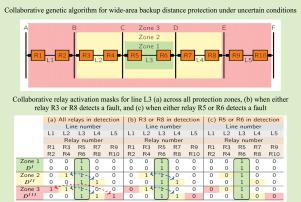不确定条件下广域后备距离保护的协同遗传算法
IF 4.2
3区 工程技术
Q2 ENGINEERING, ELECTRICAL & ELECTRONIC
引用次数: 0
摘要
由于电网保护的不确定性,可能导致故障排除的漏失或延迟,电力系统后备保护面临着越来越大的挑战。提出了一种广域备份距离保护协同遗传算法(CGA)。在该方案中,1区继电器的故障检测立即触发其配对继电器也检测故障。对于区域2和区域3检测,该方案激活其区域的配对继电器以及来自较早区域的所有配对继电器。在训练过程中,CGA利用协同性能指标和理想性能指标对继电器权重因子进行优化,引导目标函数向真实故障定位方向发展。作为直接影响本研究的因素,混合输电线路、微电网弹性和可再生综合电力系统都是非常相关的应用。该模型的实际意义在于增强保护检测。仿真结果表明,基于遗传算法的方案优于传统遗传算法和标准遗传算法,在最佳、基本和最坏情况下的故障识别成功率分别为99.69%、99.19%和95.83%。与现有方法不同,CGA在所有场景下都保持了99%以上的优异性能,没有不确定性。这大大提高了最坏情况下的性能和整体保护可靠性。本文章由计算机程序翻译,如有差异,请以英文原文为准。

Collaborative genetic algorithm for wide-area backup distance protection under uncertain conditions
Power system backup protection encounters growing challenges due to network protection uncertainties which can lead to missed or delayed fault clearance. A novel collaborative genetic algorithm (CGA) approach over wide-area backup distance protection is developed to coordinate multiple distance relays. In the proposed scheme, a zone-1 relay’s fault detection immediately triggers its paired relay to also detect the fault. For zone-2 and zone-3 detections, the scheme activates their zone’s paired relays as well as all paired relays from earlier zones. During training, the CGA optimizes relay weighting factors using collaborative and ideal performance metrics, guiding the objective function towards the true fault location. As a direct influence on this study, hybrid transmission lines, microgrid resilience, and renewable integrated power systems are very relevant applications. The practical implication of the present model is to enhance protection detection. Simulation results demonstrate that the CGA-based scheme outperforms the conventional and standard GA approaches, achieving fault identification success rates of 99.69%, 99.19%, and 95.83% in best-, base-, and worst-case scenarios, respectively. Unlike the existing methods, the proposed CGA maintained excellent performance beyond 99% in all scenarios without uncertainty. This significantly improves worst-case performance and overall protection reliability.
求助全文
通过发布文献求助,成功后即可免费获取论文全文。
去求助
来源期刊

Electric Power Systems Research
工程技术-工程:电子与电气
CiteScore
7.50
自引率
17.90%
发文量
963
审稿时长
3.8 months
期刊介绍:
Electric Power Systems Research is an international medium for the publication of original papers concerned with the generation, transmission, distribution and utilization of electrical energy. The journal aims at presenting important results of work in this field, whether in the form of applied research, development of new procedures or components, orginal application of existing knowledge or new designapproaches. The scope of Electric Power Systems Research is broad, encompassing all aspects of electric power systems. The following list of topics is not intended to be exhaustive, but rather to indicate topics that fall within the journal purview.
• Generation techniques ranging from advances in conventional electromechanical methods, through nuclear power generation, to renewable energy generation.
• Transmission, spanning the broad area from UHV (ac and dc) to network operation and protection, line routing and design.
• Substation work: equipment design, protection and control systems.
• Distribution techniques, equipment development, and smart grids.
• The utilization area from energy efficiency to distributed load levelling techniques.
• Systems studies including control techniques, planning, optimization methods, stability, security assessment and insulation coordination.
 求助内容:
求助内容: 应助结果提醒方式:
应助结果提醒方式:


